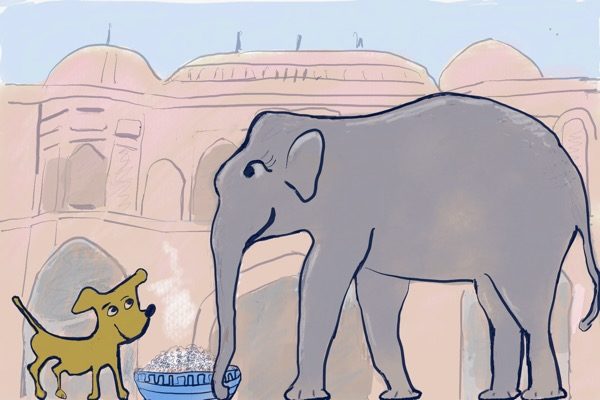The Dog and the Elephant

The Dog and the Elephant
A story from India that shows how friendship is more important than fine food and living the high-life.
This story includes a few words from the most used Indian language, Hindi.
Words translated by Jana Elizabeth.
Haan = Yes
Ji = In Indian culture, adding Ji after a name is meant to convey warmth and respect.
Doste = Friend
Haathi = Elephant
Ghee = Clarified butter
Dhal = Lentils
Adapted by Bertie.
Read by Richard.
Produced by Jana Elizabeth.
Illustrated by Bertie.
There was once an elephant who belonged to a maharajah of India and who lived in great style. The Maharajah’s personal chef prepared great quantities of rice for the elephant to eat every day - not just any old rice, but fluffy, savoury smelling basmati rice, with cardamon pods, cloves, cumin seeds and a touch of red saffron - a dish fit for a king or queen.
Now in the same palace there also lived a dog who belonged to one of the servants. He was not nearly so lucky as the elephant, and had to get by on a few dollops of butter called ghee or a spoonful or two of lentils called dhal for his breakfast. In the mornings, he would pass by the stable where the elephant lived and take in the wonderful smell of the rice. How he loved that aroma! But oh, how hungry it made him feel.
One day, the dog could hold back no longer. He slipped through a gap under the door to the stable, and saw the elephant eating his breakfast.
“Hail, oh great one!” said the dog. “I humbly ask if I may eat a few mouthfuls of your wonderful rice.”
“Haan-Ji doste,” said the elephant, which is a most respectful way of saying ‘yes my honoured friend’, and the dog, who was very much reassured by the elephant’s good manners, stepped forward and ate a share of the rice.
“Thankyou oh great Haathi.”
After that, the dog became a regular guest at the home of the elephant, and the two became great friends. When the elephant went out and about on Royal Business, the dog went too. He was starting to fill out and looked far less scrawny than before. In fact, he turned out to be quite a handsome young hound - so much so - that one day a wealthy man asked the elephant keeper if he could buy the dog.
Now the elephant keeper was not the master of this dog. He actually belonged to another servant in the palace, but seeing an opportunity to make a few rupees. He agreed a price with the wealthy man to let him take the dog away to his home.
Now neither the dog nor the elephant, nor indeed the dog’s rightful owner, was happy about this occurrence. The elephant keeper made up a story that the dog had run away. The elephant did not believe such a thin tale, and pined for his friend. He refused to eat his rice, no matter how tasty the chef made it. The Maharaja noticed how the prized elephant was growing thin, and sent his personal doctor to find out the cause. The doctor examined the elephant very carefully before reporting back to his master:
“Oh Great One,” he said, “I can find no physical cause for the honoured elephant’s distress, and I must conclude that his ailment is psychological. My conjecture is that he is pining for a lost loved one, or a much valued friend, who has died or otherwise gone away out of his life.”
The Maharaja called for the elephant keeper and related to him the words of the wise doctor. “Can you think who this prized loved one or dear friend might be?” he asked.
The elephant keeper knew right away that the dearest friend of the elephant was the dog. He told this to his master, and said that somebody had taken him away.
The Maharaja, when he heard this, put out a proclamation that whoever had taken the dog from the Royal Elephant Stables must return him or face severe punishment. The wealthy man heard this news, and hastily returned the dog to the elephant keeper. And the elephant keeper, who had spent most of the money he had received for the dog, returned a few rupees to the man. And in this way the two great friends, the dog and the elephant, were once again united, and both of them ate Royal Rice and thrived in each other's company. More importantly than food, they had love and friendship.
And Bertie says that this story is from a series of traditional Indian stories called The Jataka.
For now, from me Richard, Goodbye.